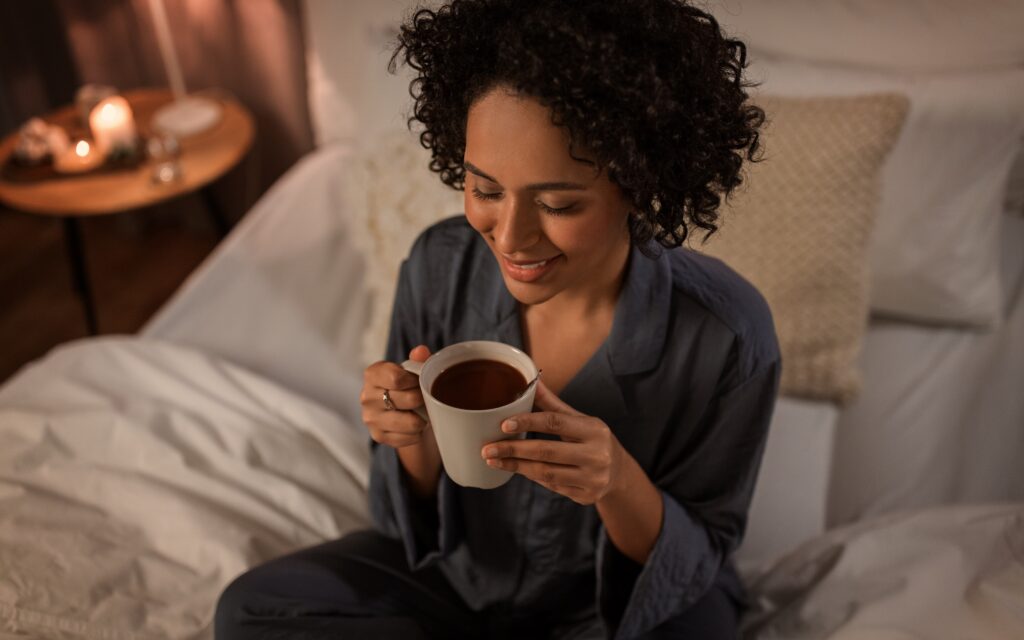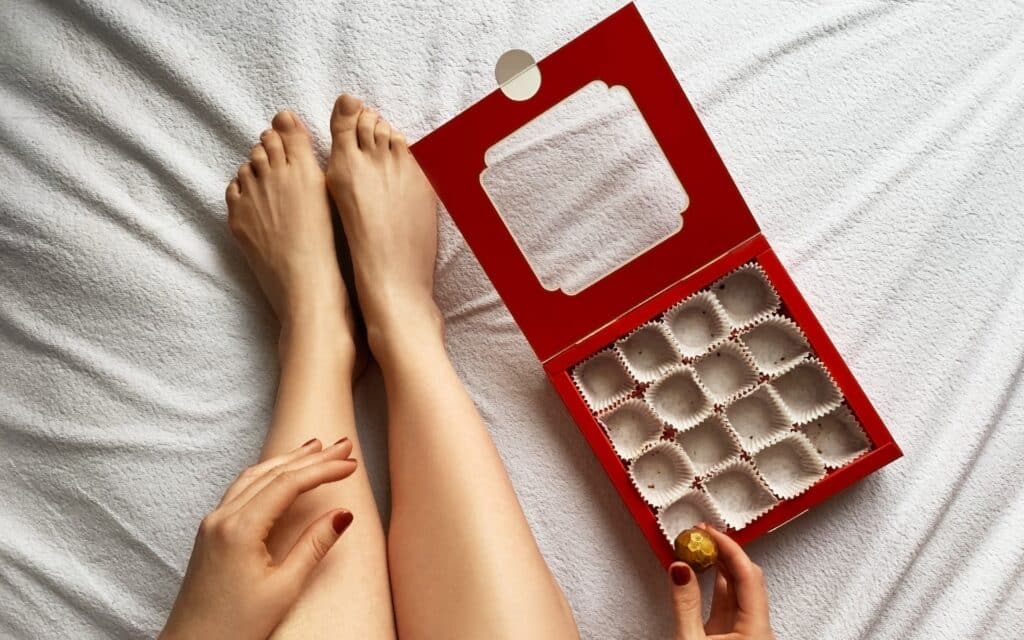Does eating chocolate before bed give you nightmares, or could it be a valuable tool for ensuring a good night’s sleep? Over the years, research into chocolate has revealed a huge range of both positive and negative effects from consuming chocolate. Keep on reading to get a taste for the interesting connection between chocolate and dreams.
On the one hand, eating dark chocolate (in moderation) can help reduce inflammation, combat oxidative stress, and even improve the health of your brain and heart. On the other hand, certain types of chocolate have high levels of sugar and fats, which can lead to weight gain, and play havoc with your energy levels.
So, does chocolate cause nightmares? Or does chocolate help you sleep? Let’s look at the science.
What happens if you eat chocolate before bed?
Chocolate is the world’s favorite sweet treat. Product scientists have progressively been learning more about this for the last few years. Chocolate contains the amino acid tryptophan, which is used to produce our overall happiness hormone serotonin.
Serotonin is among the neurotransmitters responsible for regulating both sleep and mood. Serotonin levels increase with the amount of cacao in your chocolate.
Chocolate gives us a fantastic dopamine boost, when we need the extra help after a bad night’s sleep. But it also seems chocolate before bed could be beneficial for inducing sleep. It’s an indulgent experience, which can create feelings of euphoria and happiness, when enjoyed in moderation.
Whether it’s safe to eat chocolate before bed or not generally comes down to the kind of chocolate you’re going to be consuming. For instance, dark chocolate is a surprisingly healthy food, packed with significant numbers of antioxidants. In fact, cocoa and dark chocolate can have more antioxidant activity, flavanols, and polyphenols, than fruit!
Dark chocolate helps with reducing blood pressure, improving circulation, and improving brain function. For your sleep pattern, dark chocolate has actually been linked to better, more peaceful evenings of rest.
It’s one of the reasons why a hot chocolate before bed is such a common remedy for sleep.

Does hot chocolate help you sleep?
If you’ve ever been offered a cup of hot cocoa when struggling to sleep, you’re not alone.
Cocoa has been a popular sleep remedy for a number of years. It was first cultivated by the Mayans, who used to sip cocoa beans and spices before bed.
As we mentioned before, chocolate contains high levels of tryptophan, the substance also famous for helping to promote relaxation after you consume warm milk or turkey. Hence the old advice to eat turkey to feel sleepy.
Now we know chocolate is part of the group of nutrients that contains the base for serotonin production. And so is warm milk. The two together must be sleep mix made in heaven. Having hot chocolate before bed helps to flood your brain with serotonin, which make you feel relaxed, and ready for sleep.
At the same time, many researchers believe drinking hot drinks like cocoa regularly before bed can be a good way to create a sleep routine. If your brain begins to associate drinking hot chocolate with bed time, it can help to promote the release of melatonin, which regulate the sleep cycle. Just make sure you keep your hot chocolate serving to just the one cup, to avoid weight gain.
Caffeine in chocolate: Is there caffeine in hot chocolate?
So, if there are so many positives to drinking hot chocolate before bed, or eating chocolate before a snooze, why do some experts say chocolate keeps you awake? The short answer is: chocolate does contain some caffeine. As most people know caffeine blocks the release of our sleep hormone, melatonin.
There are a number of reasons why chocolate can cause problems with your sleep pattern. Let’s start by looking at the level of caffeine in hot chocolate, and most chocolate products.
For every 100 grams of dark chocolate, you’ll find around 30-60mg of caffeine. This is about half of a cup of coffee, so it’s not a huge amount of extra caffeine if you’re worried about going to sleep after a midnight snack. However, this extra boost of caffeine can be problematic if you’re eating large amounts of chocolate before bed.
It’s also worth noting that chocolate’s caffeine content can build on top of any other caffeinated beverages or foods you’ve been enjoying through the day. This could mean you’re more likely to surpass your daily recommended allowance.
Notably, caffeine isn’t the only substance in chocolate and hot chocolate which might cause problems with your sleep. To answer the question “Can hot cocoa keep you awake?” scientists looked at the contents of chocolate, and discovered another stimulant: Theobromine.
Found alongside caffeine in cocoa solids, this substance gives dark chocolate its bitter taste. Theobromine and caffeine are both responsible for naturally stimulating the central nervous system and elevating feelings of alertness.
Cocoa solids contain more theobromine on average than caffeine, which could be part of the reason why chocolate can make us feel more alert and awake. On the plus side, theobromine does have some benefits, like anti-inflammatory properties and the ability to possibly inhibit tumour growth.
Chocolate and dreams: Does chocolate cause nightmares?
There are a number of reasons why chocolate could negatively influence your sleep outside of the contents of caffeine and theobromine. If you’re wondering “does chocolate help you sleep?” it’s worth considering how much sugar is in the chocolate you’re planning on eating (or drinking).
Chocolate is naturally high in sugar, which can have a negative impact your health, your weight, and your sleep pattern. Even if hot chocolate only contains around 5mg of caffeine per mug, if you combine that with excess amounts of sugar, you’re going to be more likely to stay awake.
Studies consistently show people who have diets higher in sugar are generally more likely to suffer from restlessness at night. These people also struggle with lighter sleep, so they may continue to feel tired through the day, which prompts them to consume extra sugar.
When it comes to answering the question: Does eating chocolate before bed give you nightmares? There are still only a handful of studies out there looking into this concept. There’s a theory that the caffeine in chocolate partly prevents the needed muscle paralysis in REM sleep. This could be a possible trigger of nightmares in some people.
One case report found eating heavy amounts of chocolate or sugary products before bed could worsen the symptoms of a disorder, which cause sufferers to act out their violent nightmares. The study looked at the REM Sleep Behavior disorder “RBD”, which affects around 1 in 200 people.
According to this report, the sleep behavior of one man was directly influenced by what he had eaten the night before going to sleep. The man who lashed out during recurrent nightmares was more likely to have issues after eating chocolate biscuits, syrup, and ice cream.

Eating sweets before bed: Does sugar cause nightmares?
Studies into chocolate and dreams are still somewhat limited. From what we can see, while some people do have nightmares and bad sleep following the consumption of chocolate, there aren’t a lot of specific reports which indicate chocolate as the primary source of the problem.
Ultimately, it’s more often the sugar within chocolate which causes the problem, rather than the chocolate or cocoa itself. A milk chocolate bar will usually contain somewhere in the region of 20-25g of sugar per 50g bar. This is 100% of the daily recommended sugar intake for adults. Studies indicate sugar definitely does cause problems with your dreams.
If you’re consuming high amounts of sugar, you’re more likely to experience bizarre dreams, and problems with your slumber.One report published by the Frontiers of Psychology tested 396 students to see whether a correlation existed between dreams and diet.
31% of the subjects reported disturbing or bizarre dreams after eating cake and cookies. This indicates that while you might enjoy a little snack before bed, chocolate high in sugar or similar sugary substances might not be the best bet.
Hot chocolate before bed: A Good or bad idea?
When it comes to answering the questions “Does eating chocolate before bed give you nightmares?”
”Does chocolate milk help you sleep?”, “Does hot chocolate keep you awake?” or even “What foods cause nightmares?” it’s worth noting the answer won’t be the same for everyone.
There are substances in chocolate which can keep us awake at night, as well as substances commonly associated with helping us sleep, like tryptophan. For the most part, if you are planning on eating or drinking chocolate before bed, your best strategy will probably involve staying away from too sugary chocolate and sweets.
Pay attention to how you respond to eating different foods before bed and consider adapting your bedtime snacking habits accordingly. If you think eating chocolate before bed is problematic for you, it might be a good idea to try something else instead. A caffeine-free cup of tea could be as good at relaxing your body as a cup of hot chocolate.
Siestio. Sleep Matters.
Now read these:
—Does cheese give you nightmares?
—Why does wine make me sleepy?
—Does drinking milk help me sleep?
General advice disclaimer
This article contains general tips and advice. However, no diet or exercise program should be started without consulting your physician or other industry professional first. For more information read our full disclaimer here.







